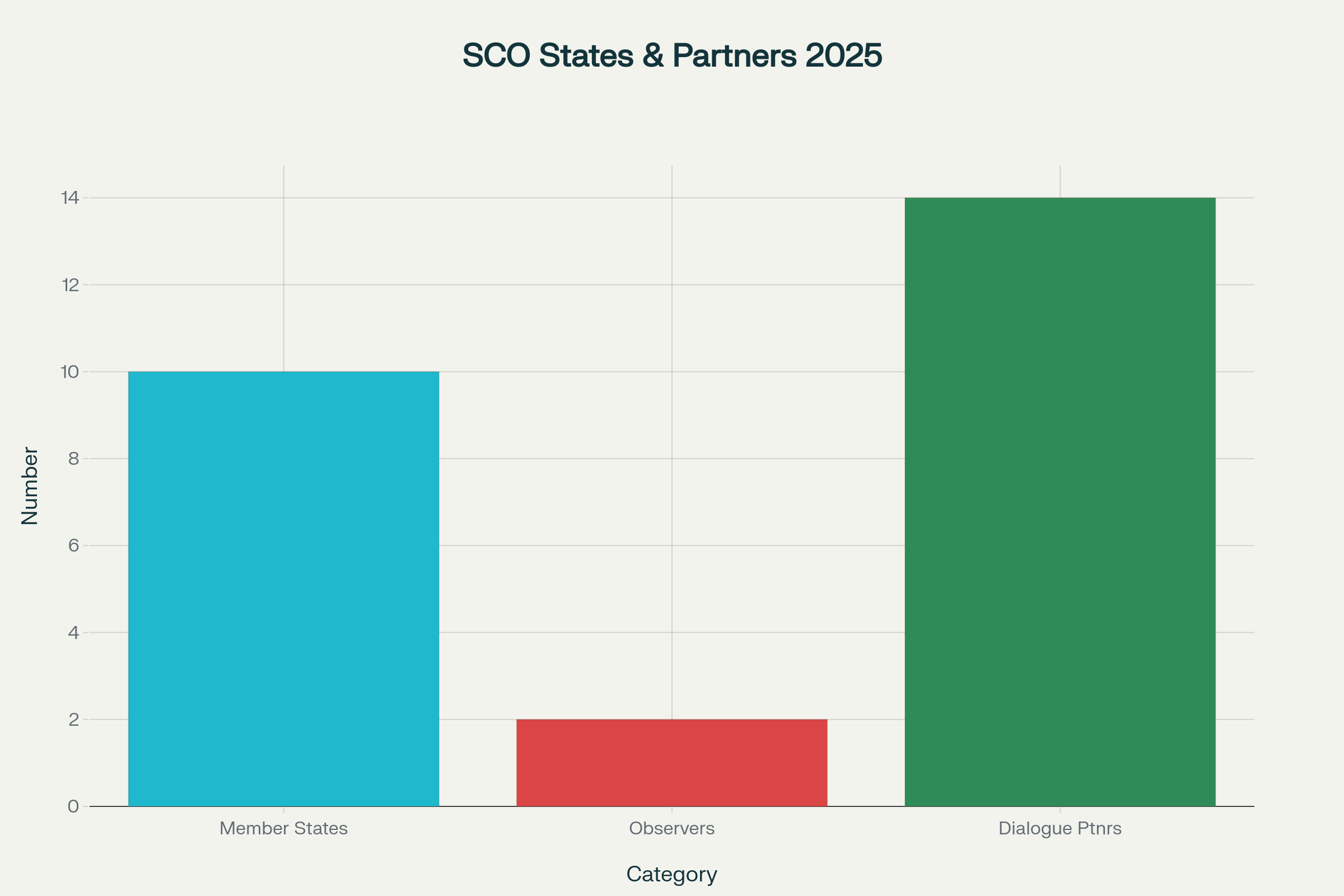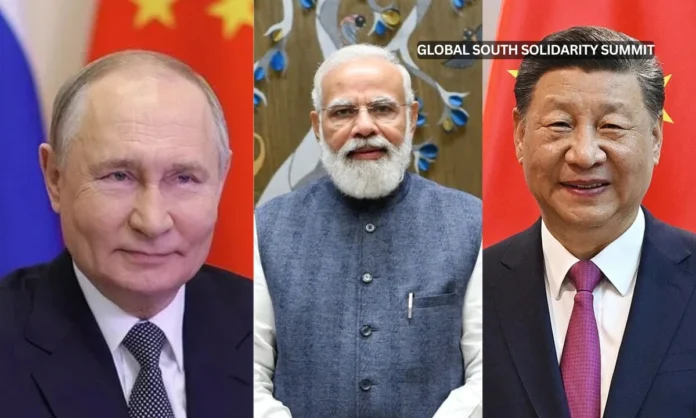Key Highlights
- Prime Minister Modi will visit China for the first time in over seven years, attending the SCO summit in Tianjin from August 31-September 1
- The summit will feature leaders from 20+ countries in an unprecedented show of Global South solidarity against US-led geopolitical pressure
- Recent India-China diplomatic breakthrough includes resumed trade through three border passes and renewed visa cooperation
Opening Overview: Strategic Realignment in an Era of Uncertainty
Chinese President Xi Jinping will host Prime Minister Narendra Modi and Russian President Vladimir Putin in what analysts describe as a pivotal moment for Global South unity amid escalating tensions with the Trump administration. The Shanghai Cooperation Organisation (SCO) summit in Tianjin, scheduled for August 31 to September 1, marks Modi’s first visit to China in more than seven years and represents a significant diplomatic recalibration.
The timing of this Global South solidarity gathering comes as the Trump administration imposes severe tariffs on India and escalates confrontations with China, Iran, and Russia. Xi Jinping’s strategic hosting of this expanded summit demonstrates how Global South solidarity is becoming an increasingly powerful counterweight to Western-led international order. The SCO summit will feature the largest gathering since the organisation’s founding in 2001, underlining the growing appeal of alternative multilateral frameworks among developing nations.
This summit occurs against the backdrop of remarkable India-China diplomatic progress, with both nations agreeing to reopen border trade through three designated passes and resume direct flights as part of broader efforts to stabilise bilateral relations. The Global South solidarity on display will test whether emerging economies can present a unified alternative to traditional Western leadership in global affairs.
Expanded SCO: A Platform for Alternative Global Governance
Key Developments in SCO Expansion
- Organisation now includes 10 full members, 2 observers, and 14 dialogue partners
- Recent additions include Iran (2023) and Belarus (2024) as full members
The Shanghai Cooperation Organisation has evolved dramatically from its original six-nation security framework into a comprehensive platform representing Global South solidarity across multiple continents. The organisation currently comprises 10 full member states, 2 observers, and 14 dialogue partners, making it one of the world’s largest regional alliances by population and geographic coverage.
Iran’s accession as a full member in July 2023 and Belarus’s admission in July 2024 demonstrate the SCO’s expanding appeal among nations seeking alternatives to Western-dominated institutions. These additions reflect growing Global South solidarity as countries increasingly align themselves with China and Russia’s vision of multipolar global governance. The organisation’s remit has expanded far beyond its original security focus to encompass economic cooperation, trade facilitation, and cultural exchanges.
Eric Olander, editor-in-chief of The China-Global South Project, emphasises that Xi Jinping will use this summit to showcase what a post-American-led international order might look like. The Global South solidarity demonstrated through SCO expansion sends a clear message that US efforts to counter China, Iran, Russia, and now India have not achieved their intended isolating effects.

Composition of the Shanghai Cooperation Organisation (SCO) in 2025
India-China Diplomatic Breakthrough: Border Trade and Strategic Reconciliation
Recent Bilateral Agreements
- Reopened trade through Lipulekh, Shipki La, and Nathu La passes
- Resumed direct flight connectivity and eased visa processes
- Structured roadmap for permanent border resolution
The most significant development preceding the SCO summit has been the remarkable improvement in India-China relations following years of border tensions. On June 26, 2025, Indian Defence Minister Rajnath Singh met his Chinese counterpart Dong Jun, where he called for a permanent resolution to the border dispute through a “structured roadmap of permanent engagement and de-escalation”.timesofindia.
This diplomatic breakthrough has produced concrete results, with both nations agreeing to reopen border trade through three designated passes: Lipulekh, Shipki La, and Nathu La. Additionally, India announced the resumption of tourist visas for Chinese citizens in July 2025, ending a five-year suspension imposed following the 2020 border skirmishes. These measures demonstrate how Global South solidarity can facilitate practical cooperation even between traditional rivals.
China has also agreed to address India’s concerns over export curbs on critical commodities including fertilisers, rare earth magnets, minerals, and tunnel boring machines. This understanding followed high-level discussions between China’s Wang Yi and Indian External Affairs Minister S. Jaishankar during Wang’s July 2025 visit to India. The progress reflects both nations’ recognition that Global South solidarity requires moving beyond bilateral disputes toward broader strategic cooperation.
The timing of these agreements directly precedes Modi’s participation in the SCO summit, suggesting coordinated diplomatic efforts to present a united front representing Global South solidarity against increasing Western pressure, particularly from the Trump administration’s aggressive trade policies.
BRICS Momentum: Reinforcing Multipolar Aspirations
BRICS 2025 Expansion Results
- Indonesia joined as new full member
- 11 new partner countries welcomed, including Malaysia, Vietnam, and Nigeria
- Focus on climate action, AI governance, and equitable health systems
The recent BRICS summit in Rio de Janeiro, Brazil, from July 6-7, 2025, provided crucial momentum for Global South solidarity ahead of the SCO gathering. The summit’s theme, “Strengthening Global South Cooperation for a More Inclusive and Sustainable Governance,” directly aligns with the SCO’s expanding mission to present alternative global leadership.
Indonesia’s admission as a full BRICS member, alongside 11 new partner countries including Belarus, Kazakhstan, Malaysia, Thailand, Vietnam, Nigeria, and Uganda, demonstrates the growing appeal of Global South solidarity frameworks. These expansions create overlapping membership between BRICS and SCO, strengthening coordination between the two organisations and amplifying their collective influence in international affairs.
The BRICS summit launched several initiatives that complement SCO objectives, including the BRICS Leaders’ Framework Declaration on Climate Finance, a statement on Global Governance of Artificial Intelligence, and the BRICS Partnership for the Elimination of Socially Determined Diseases. These commitments show how Global South solidarity extends beyond mere opposition to Western hegemony toward constructive alternative governance models.
President Trump’s visible frustration with BRICS expansion, as noted by analysts, confirms that Global South solidarity through organisations like BRICS and SCO is achieving its intended effect of challenging US-led international order. The coordination between these platforms creates multiple venues for developing nations to articulate shared interests and coordinate responses to Western pressure.
Geopolitical Implications: Testing Alternative Multilateralism
Strategic Challenges and Opportunities
- Internal SCO tensions between India and Pakistan remain unresolved
- Limited track record of substantial policy implementation
- Growing appeal as alternative to Western-dominated institutions
Despite the impressive optics of Global South solidarity, the SCO faces significant challenges in translating political symbolism into concrete policy outcomes. The June SCO defence ministers’ meeting was unable to adopt a joint statement after India raised objections over the omission of the April 22 Pahalgam attack, highlighting persistent tensions between core members India and Pakistan.
Manoj Kewalramani, chairperson of the Indo-Pacific Research Programme at the Takshashila Institution, notes that while the SCO has “increasing convening power” that helps in “narrative projection,” its “effectiveness in addressing substantial security issues remains very limited”. This assessment underscores the gap between Global South solidarity rhetoric and practical multilateral cooperation.
However, analysts argue that the bloc’s appeal should not be underestimated, particularly given current geopolitical uncertainties and Trump administration policies that alienate traditional allies. The Global South solidarity demonstrated through SCO expansion offers developing nations an alternative framework for international engagement, even if specific policy coordination remains limited.
Eric Olander emphasises that the summit is “about optics, really powerful optics,” suggesting that Global South solidarity functions as much through symbolic demonstration as through concrete policy alignment. Modi’s participation, despite India’s recent disagreements with other SCO members, indicates that even traditional US partners recognise the value of maintaining options within multipolar frameworks.
Closing Assessment: Symbolic Unity with Strategic Limitations
The Tianjin SCO summit represents a watershed moment for Global South solidarity, bringing together leaders from across Asia, Africa, and Latin America in an unprecedented show of unity against Western-led international order. Modi’s historic return to China after seven years, alongside Putin’s extended visit for World War 2 commemorations, creates powerful symbolism that alternative multilateral frameworks are gaining momentum and credibility.
The recent diplomatic breakthrough between India and China, including reopened border trade and renewed visa cooperation, demonstrates that Global South solidarity can facilitate practical cooperation even between historical rivals. Combined with BRICS expansion and coordination, these developments suggest that developing nations are increasingly confident in pursuing independent foreign policy paths rather than choosing sides in US-China competition.
However, the SCO’s limited track record in producing substantial policy outcomes and persistent internal tensions between members like India and Pakistan highlight the challenges of translating Global South solidarity into effective multilateral governance. While the summit will undoubtedly strengthen political ties and symbolic unity, its lasting impact will depend on whether participating nations can move beyond shared grievances toward constructive alternative governance models.
The Global South solidarity on display in Tianjin ultimately reflects a broader transformation in international relations, where developing nations increasingly reject binary choices between competing powers in favour of maintaining strategic autonomy through multiple multilateral partnerships.


